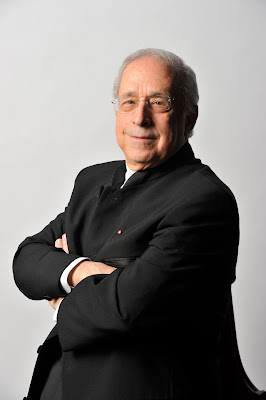Rudolfinum
October 23
Talk about a class act. The birthday celebration that the Czech Philharmonic gave for conductor Lawrence Foster on Sunday was everything a good gala concert should be: big stars, fine performances, camaraderie and good cheer all around. And in contrast to last year’s tribute to Sir Charles Mackerras, no speeches – just an evening of superb music honoring one of its great practitioners.
 |
| An A-list of musical friends. |
Foster made an unassuming entrance on a stage jammed with musicians and overflowing with flowers for the opening piece, Enescu’s Romanian Rhapsody No. 2. Just as Mackerras championed Janáček, Foster has been the chief promulgator of Enescu’s music to the Western world. So it was a treat to hear him conduct even this small sampling of the Romanian composer. Not as bright or engaging as the familiar Romanian Rhapsody No. 1, No. 2 nonetheless has its own points of interest – regal overtones, compelling solo lines and a warm emotional underpinning. Foster brought all that to life with fine, clear layers of sound and heartfelt expression.
The orchestra shrank to about 30 players and Foster himself took a break when Sarah Chang came out for two short Vivaldi pieces, “Winter” and “Summer” from The Four Seasons. Even that brief appearance was enough to show why the violinist is in such great demand. Chang took one of the most clichéd works in the classical repertoire and gave it substance, playing with a captivating combination of emotion and authority. Now 30, Chang is well past her longtime “child prodigy” label, but still an exceptional talent.
 |
| As promised. |
Though not the biggest name of the night – not yet, anyway – cellist Alisa Weilerstein made the biggest impression. With Foster and a mid-sized orchestra providing accompaniment, she more than lived up to her advance billing, playing Tchaikovsky’s Variations on a Rococo Theme with dazzling technique and impassioned eloquence. Weilerstein is a rarity, an intensely focused player who produces a surprisingly light, finely crafted sound. She rarely looks at the strings when she plays; her head is usually tilted back and her eyes closed, like she’s receiving divine inspiration. This performance marked Weilerstein’s Prague debut, and the audience (and many of the musicians) responded with enthusiastic applause, prompting an encore of the piece’s final movement.
After intermission, the second half opened with three gray-haired eminences walking onstage: Foster and pianists Radu Lupu and Daniel Barenboim. They were all business, barely acknowledging the applause as they sat together at one piano and launched into Schubert’s Piano Fantasia in F minor for four hands, with Foster handling the page-turning duties. Barenboim set the tempo in the lower register and Lupu added seamless top melodies in a smart, fluid reading of the piece. Both men can be much more flamboyant; this was a masterful exercise in precision and control.
Barenboim and Lupu went to separate pianos as the orchestra came back onstage for Mozart’s Concerto for two pianos and orchestra in E flat major (KV 365) with Foster at the podium. If the orchestra sounded a bit heavy, perhaps it was because the two pianists played with such elegant lyricism. Barenboim was particularly graceful, playing the solo melody lines like ripples on water. The performance drew animated applause, an amusing contrast to the figures that Lupu and Barenboim cut on stage: in all-black suits with a mien to match, they looked more like undertakers than musicians. A hug from Foster and an armful of flowers finally prompted Barenboim to crack a smile.
Earlier in the week, Foster had pondered letting the orchestra play the finale, “The Moldau” from Smetana’s Má vlast, without a conductor. “It probably would sound the same with or without me,” he said. This critic has to respectfully disagree. Staying at the podium, he lent the piece a deliberate, measured tempo that it doesn’t always have. Foster has said he likes the “burnished gold” sound of the Czech Philharmonic, and it was at the forefront of his interpretation, rich with creamy woodwinds and shimmering strings.
It says something about Foster that his closest friends in the music business span a nearly 40-year age range, from young soloists he helped discover and nurture to major international superstars. Photos in the program of the conductor and his wife Angela with Arthur Rubinstein and Paul McCartney (and a jovial Barenboim!) suggest an even greater breadth of accomplishment and admiration. It’s safe to say that on his 70th birthday, Foster added a few more fans to an already long and impressive list.
For more on Lawrence Foster’s work and career: http://www.harrisonparrott.com/artist/lawrence-foster
Photos: Foster/Marc Ginot; Weilerstein/Jamie Jung
No comments:
Post a Comment